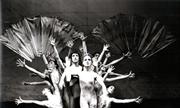Equus - Segal Centre of Arts
I break horses
Equus mesmerizes with bold staging, unorthodox video projections and an excellent cast
By Neil Boyce
September 22, 2011
It’s tempting to do a “compare and contrast” of the Segal season opener, Peter Shaffer’s Equus. This past April, Montreal audiences saw a different English production at the Rialto. Directed by Paul Van
Dyck, it took place in a small setting and with a limited budget, but was a great show that drew viewers into its dark drama. The current production, by London-based Israeli director and choreographer Domy Reiter-Soffer, is equally effective, but another animal entirely: big stage, big set, big actor in the lead, and a show that wants to impress by knocking you over. Reiter-Soffer’s Equus overwhelms its
audience with bold staging, video projections and a loud, pulsing sound design for a very cinematic treatment.
Shaffer’s story is as fresh and relevant today as when it premiered at London’s Old Vic in 1973. Psychiatrist Martin Dysart is asked by a colleague to take on a difficult case treating a stable-boy in
rural England taken into custody after blinding six horses with a metal spike. The play is book-ended with reflective monologues from Dysart (played by Jean Mar-chand). He readily admits he’s in “professional menopause,” feeling ineffective in his career, and becomes easily drawn into the world of his young patient, Alan Strang.
Dan Jeanotte’s portrayal of Strang isn’t the actor’s first venture outside the sketch comedy of his group Uncalled For, nor is it even his first dramatic role, but getting cast as co-lead in such a demand-ing, high-profile part does lend the performance a break-out feel, and he’s a solid and expressive actor.
It’s a complex work, pitting passion against reason, questioning the consequences of “curing” a patient who feels alive for the first time. Marchand’s perfectly crisp enunciation underscores the Doc-tor’s
weariness. “The great thing about being in the adjustment business is you’re never short of customers,” he scoffs.
Supporting actor Daniel Lillford is captivating as Strang’s stern, socialist-atheist father Frank. Torn between the worlds of his father and Bible-reading mother (Ellen David), young Strang makes a deity
of his own in Equus, a horse-god in whom he invests all his commingled desires for worship, power and sexual release.
Reiter-Soffer has heightened the artificiality of the piece—situating it in a symbol-laden fantasy world to match Strang’s intoxicating visions. Swirling video projections form the backdrop as Strang reveals the world he’s constructed to replace his drab life: a sensual, sensory-overloaded world that engulfs him as he sneaks a horse out of the stable for a midnight ride, the sweat and pounding fury of the
animal beneath him an almost unbearably ecstatic experience.
When the horses finally appear to us, they’re the fearsome, awe-inspiring creatures of Strang’s imagination. Reiter-Soffer eschews the use of masks often seen in other productions, and chose a
cast with backgrounds in ballet to play the beasts. Panting, stepping, with eyes wild and slathered in dark makeup, the dancers make an unforgettable impression, and it’s here that the director has the
surest footing.
Sharp observations, brilliantly crafted, run through Shaffer’s text. Dysart can restore Strang to normality, but only by excising from him “parts of individuality repugnant to this God…parts sacred to
rarer and more wonderful Gods.”
And when Dysart thinks how Strang might regard the Doctor’s own existence, he imagines him saying “At least I’ve galloped—when have you?” .
![/images/pictures/Sarah[1].jpg](/images/pictures/Sarah[1]_thumbnail.jpg)
